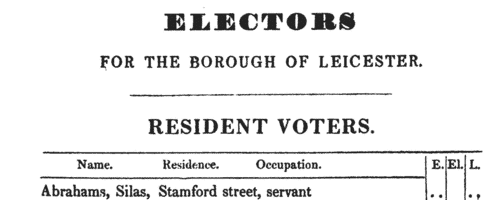Our indexes include entries for the spelling hind. In the period you have requested, we have the following 703 records (displaying 301 to 310):
Dissolutions of Partnerships
(1826)
Trade partnerships dissolved, or the removal of one partner from a partnership of several traders
| Sample scan, click to enlarge

|
Freeholders voting in Castle ward, Northumberland
(1826)
An election to choose two knights of the shire to represent Northumberland took place at Alnwick from 20 June to 6 July 1826. The candidates were Henry Thomas Liddell (L), Matthew Bell (B), Thomas Wentworth Beaumont (Bt) and Viscount Howick (H). The franchise included all freeholders of property worth 40 shillings or more per annum: each had two votes, but could plump for a single candidate. This poll book was published in 1827 and lists the voters from each ward: the freeholder's full name (surname first), residence, and the nature of the freehold (such as 'house at Corbridge'). The votes are shown in the right hand columns, with plumpers shown by a dagger. Castle ward included North Shields and the surrounding countryside. | Sample scan, click to enlarge

|
Insolvents
(1827)
Insolvency notices for England and Wales: insolvency often caused people to restart their lives elsewhere, so these are an important source for lost links | Sample scan, click to enlarge

|
Retired East-India Company Officers
(1827)
The official list of retired military officers of the Hon. East-India Company gives name (surname and christian name or initials); rank; establishment; and date of retirement - corrected to 1 September 1827.
| Sample scan, click to enlarge

|
Dissolutions of Partnerships
(1828)
Trade partnerships dissolved, or the removal of one partner from a partnership of several traders
| Sample scan, click to enlarge

|
Insolvents
(1828)
Insolvency notices for England and Wales: insolvency often caused people to restart their lives elsewhere, so these are an important source for lost links | Sample scan, click to enlarge

|
Dissolutions of Partnerships
(1829)
Trade partnerships dissolved, or the removal of one partner from a partnership of several traders
| Sample scan, click to enlarge

|
Deaths, Marriages, News and Promotions
(1831)
Death notices and obituaries, marriage and birth notices, civil and military promotions, clerical preferments and domestic occurrences, as reported in the Gentleman's Magazine. Mostly from England and Wales, but items from Ireland, Scotland and abroad.
| Sample scan, click to enlarge

|
Cambridgeshire Voters: Cambridge
(1832)
The poll on the election of three knights of the shire to serve in Parliament for the county of Cambridge, was taken at Cambridge, Royston, Newmarket, Ely, Wisbech and Whittlesea 18 and 19 December 1832. The candidates were Henry John Adeane esquire, Richard Greaves Townley esquire, Charles Philip Yorke esquire and John Walbanke Childers esquire. This poll book sets out the names of the voters in alphabetical order hundred by hundred and parish by parish. The voters' full names are stated, surname first. The right hand column records their votes. The new qualification for suffrage in the counties, after the passage of the 1832 Great Reform Bill, was the possession of a freehold estate worth 40s a year or more, a copyhold or long leasehold of £10 a year or more, or a tenancy or short leasehold of £50 a year or more.
| Sample scan, click to enlarge

|
Leicester Poll Book: Non-Resident Non-Voters
(1832)
A poll was taken on 12 and 13 December 1832 for the election of two representatives in Parliament for the borough of Leicester, the candidates being William Evans esquire (E.), Wynn Ellis esquire (El.) and J. W. Boughton Leigh esquire (L.). This poll book, printed by J. G. Brown of Leicester, gives the name, residence and occupation of all the electors, divided into four categories: resident voters, non-resident voters, resident non-voters, and non-resident non-voters. For those who polled, their votes are marked on the right hand side. Under the 1832 Reform Act the franchise within the borough had been extended to all (adult male) owners or tenants of property worth £10 a year or more. | Sample scan, click to enlarge

|
Research your ancestry, family history, genealogy and one-name study by direct access to original records and archives indexed by surname.











